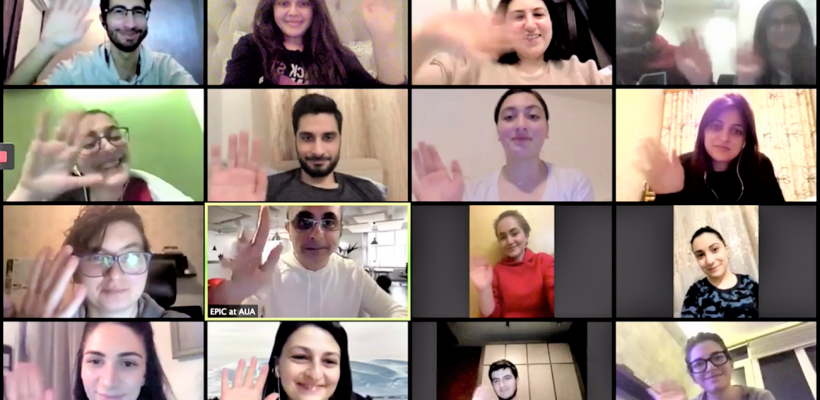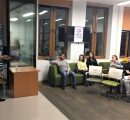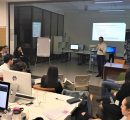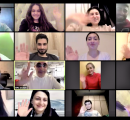
EPIC Workshops: A Commitment to Startup Success
3 min readAs the Entrepreneurship and Product Innovation Center (EPIC) of the American University of Armenia (AUA) moves forward through the Spring 2020 incubator program, it relies on the best professionals that are available in the local ecosystem to provide focused instruction, expertise, and guidance to participating startup teams to ensure the highest quality of learning. As a result of the COVID-19 outbreak, EPIC has transitioned its operations, including all the activities planned for the Spring 2020 batch, to online platforms.
As one of the most crucial components of the startups’ 12-week incubator journey, EPIC holds two-hour workshops twice a week to give startups multiple opportunities to learn, plan, and apply the key elements necessary for developing their ventures. The teams explore a diversity of topics such as assumptions mapping, customer and competitor research, idea validation, and prototyping. The workshops serve as the primary channels for providing the teams with a roadmap for building their companies. They coach the teams to accomplish their plans step-by-step and to move their ventures forward. In addition, twice a month, EPIC hosts Entrepreneurship Hack Nights where successful local and foreign entrepreneurs discuss their startup journeys, share their knowledge, and engage in discussions about their firsthand venture experience. These Hack Nights are especially valued by the startup teams, for they provide encouragement and motivation. Sometimes the Hack Nights are open to the general public via Facebook streaming, thus enabling a wider assemblage within the ecosystem to participate and benefit.
Earlier this year, EPIC had organized an orientation dinner with its instructors to build strong connections and establish productive collaboration among them. At this event, instructors were able to discuss the upcoming Spring 2020 program in detail, plan coordinated action, and socialize.
One of the early workshops on customer research was led by UX researcher from PicsArt, Tatev Hovhannisyan (BAB ’17). She introduced and demonstrated customer research methodologies and emphasized its importance in segmenting markets, targeting the right customers, and identifying early adopters. “Ms. Hovhannisyan’s session helped our startup to focus on understanding our customers more deeply which is especially important to prepare us to ask the right questions during customer interviews. Now, we are more confident in what we need to find out from our customers,” states Lia Yeghoyants, co-founder of ReView.
Customer insights, which is another topic fundamental for startup development, was presented by instructor Tatevik Torosyan. She is a business analyst with more than ten years of experience, who holds a BA in marketing and sales and an MA in European economic integration and business from the College of Europe. One of Torosyan’s motivations for leading a workshop was to share her real-life experience and knowledge with the EPIC teams. “At the same time, it is exciting to see how the startups can use this knowledge to create innovative products and services that will solve essential problems,” remarks Torosyan. She sees promising potential in EPIC’s startups and believes that, with proper market research and subsequent strategic follow-through, the teams will be able to validate and successfully implement their ideas. “I look forward to using some of the products once they make it to the market,” she noted.
Tsovinar Babayan, another EPIC workshop instructor and mentor, is a graduate of the London School of Economics with a management background and more than 15 years of work experience in managing and developing businesses in Europe. After her gratifying experience as a mentor in the Fall 2019 batch, Tsovinar had offered to lead a workshop on Assumption Mapping. “I wanted to pass on my practical experience of working at and with startups, and doing it by applying the suggested framework was quite fun,” noted Babayan. She has identified substantial capacity and enthusiasm among the teams for bringing their venture ideas to fruition, which she considers to be crucial at the current stage. Babayan has repeatedly stressed to the startups the essential role of market and customer research, knowing that in Armenia entrepreneurs are generally underdeveloped in this area.
The recent transition of the sessions to an online platform has been a challenge for EPIC and the instructors. Under the prevailing circumstances, the readiness and flexibility of the instructors have substantially contributed to the reorganization of the incubator program to a remote format. The active online collaboration among the instructors and teams has provided the foundation for the sustained quality of learning and effective dialogue. The ReView startup team attests: “The online sessions were not a challenge to us. We were able to switch to the online mode easily because everything was perfectly organized and the EPIC staff was always available when we had questions or concerns. Even though online sessions are effective and fun, we cannot wait to meet face-to-face to exchange ideas and share a pizza with the instructors and our startup colleagues.”
The Entrepreneurship and Product Innovation Center (EPIC) is a platform of the American University of Armenia (AUA) for promoting entrepreneurial education, cross-disciplinary collaboration, and startup venture incubation. EPIC provides an ecosystem for emerging entrepreneurs consisting of first-class facilities and collaborative workspace, programs and events, and a network of mentors, advisors, and investors. EPIC fosters the understanding and application of entrepreneurship in students and faculty at AUA to craft high-impact multidisciplinary ventures.







